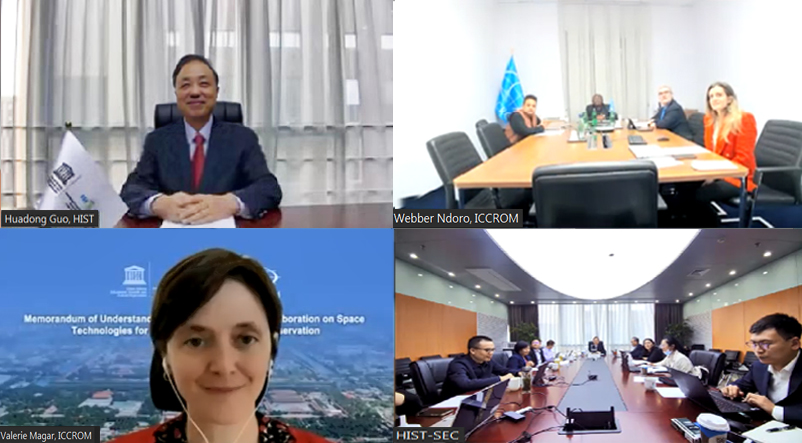
News
HIST and ICCROM sign Agreement for Collaboration on Space Technologies for World Cultural Heritage Conservation
On 24 October 2022, Professor Huadong Guo, Director of the International Centre on Space Technologies for Natural and Cultural Heritage (HIST) under the auspices of UNESCO, met online with Dr Webber Ndoro, Director-General of the International Centre for the Study of the Preservation and Restoration of Cultural Heritage (ICCROM), to sign a Memorandum of Understanding (MoU). The agreement will advance collaboration on applying space technologies to monitor, conserve and protect World Cultural Heritage sites. This joint work will support the implementation of the World Heritage Convention.

Prof Huadong Guo and Dr Webber Ndoro sign Memorandum of Understanding
World Cultural Heritage represents priceless and irreplaceable assets for humankind. There are 897 cultural heritage sites and 39 mixed (both cultural and natural) sites inscribed on UNESCO World Heritage List. It is our shared responsibility to protect, conserve and transmit the outstanding universal values of those sites to present and future generations. However, climate change, natural disasters and human activities affect some of these cultural heritage sites. The international community increasingly recognizes the role space technologies can have in helping protect and monitor them.
The 44th extended session of the World Heritage Committee requested States Parties, the World Heritage Centre, the Advisory Bodies (of which ICCROM is a part), UNESCO Category 2 Centres and other relevant institutions to continue exploring collaborative partnerships with the aim of using cutting-edge technology and innovation for the benefit of maintaining our bond with the past.
Both HIST and ICCROM are committed to maintaining long-term strategic partnership for the protection and conservation of World CulturalHeritage sites and advancing specific areas of collaboration: monitoring and evaluation, research and consultation, capacity building and the exchange of experts and information sharing.
“As this year marks the 50th anniversary of World Heritage Convention, it is significant that both sides will take a series of concerted actions to offer global public goods and services to assist UNESCO and ICCROM Member States in the implementation of the Convention and UN 2030 Agenda for Sustainable Development,” said Prof Huadong Guo.
“Our World Cultural and Natural Heritage properties are great treasures that ICCROM is committed to conserving. We look forward to working with HIST to use advanced technology to better conserve, manage and sustainably care for our heritage ,” said Dr Webber Ndoro.
Other participants joining the ceremony included Professor Wang Xinyuan, Deputy Director of HIST; Professor Fulong Chen, Deputy Director of HIST; Dr Valerie Magar, ICCROM’s Programmes Unit Manager; Mr Joseph King, ICCROM Senior Director; andDr Rohit Jigyasu, Project Manager, Urban Heritage, Climate Change and Disaster Risk Management, ICCROM.

Representatives from HIST and ICCROM
The International Centre on Space Technologies for Natural and Cultural Heritage (HIST) under the auspices of UNESCO is an international organization established in 2011 by UNESCO as a Category 2 Centre in Beijing, China, and hosted by Aerospace Information Research Institute of Chinese Academy of Sciences. It is devoted to developing and utilizing space technologies for the identification, conservation, monitoring and management of UNESCO-designated sites to support UNESCO and its Member States in the implementation of the World Heritage Convention and the UN 2030 Agenda for Sustainable Development.
The International Centre for the Study of the Preservation and Restoration of Cultural Heritage (ICCROM) is an intergovernmental organization created by UNESCO in 1956 to act as a centre of global expertise on the conservation of cultural heritage. ICCROM aims at improving the quality of conservation as well as raising awareness about the importance of preserving cultural heritage through five main areas of activity: training, information, research, cooperation and advocacy.



